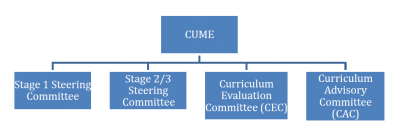In the School of Medicine, Education Council is the Central Governance body. All committees across the continuum of Medical Education and the Graduate School report to Education Council. Education Council has delegated policy development and approval to the individual program committees if that policy affects only that school; but for anything that affects more than one school or program or anything that can affect the culture of the school, Education Council has direct oversight.
Education Council
The Education Council formulates policies and plans for all educational activities sponsored by the SOM, which include but are not limited to, the undergraduate medical education, graduate and postgraduate medical education, continuing medical education, and community education. The Education Council determines the general form, and content of the educational programs, and assures their quality. It oversees the integration of the SOM faculty into the Graduate Programs. It considers the roles of off-site faculty, affiliated hospitals, and community faculty in these educational endeavors. It makes recommendations regarding priorities for the use of available resources. EC has decided to delegate policies affecting only one domain to that domain unless it could affect the culture of the SOM.
Committee on Undergraduate Medical Education (CUME)

The CUME serves as the school’s curriculum committee for the educational program leading to the M.D. degree. It approves policies for all aspects of the undergraduate curriculum, determines the structure of the curriculum, educational philosophy, overall curriculum objectives, criteria for student evaluation, promotion and graduation. This committee oversees management of the curriculum, and the ongoing review of individual courses, segments of the curriculum, and the curriculum as a whole. It assesses long range needs regarding the direction and evolution of the educational program, and explores and evaluates innovative trends in medical education. As necessary, it initiates and oversees strategic planning for the undergraduate medical education program. Finally, it ensures institutional compliance with all LCME accreditation standards, as well all relevant institutional policies, and state and federal regulations.
Curriculum Evaluation Committee (CEC)
The CEC reviews annual course evaluations and related course director annual reports and makes recommendations on ways in which each course can be improved. The committee monitors and reports on new courses and other changes in curricular content. On a 3-year cycle, the CEC will review the phases of the curriculum and the curriculum as a whole. The phase and full curriculum reviews will include benchmarking of student performance against institutional goals and objectives, as well as against available national data. CEC also continuously monitors institutional compliance with LCME standards.
Curriculum Advisory Committee (CAC)
The CAC is responsible for reviewing the work of operational committees vis-à-vis Governance to be sure that the operational committees comply with what has been mandated by Governance. Specifically, the CAC reviews coordination of the curriculum as a whole, reviews yearly academic calendars developed by operational groups, ensures appropriate integration and coordination of content within the curriculum, identifies and eliminates unwanted redundancies and gaps in content coverage, responds to any curricular needs (i.e., space, technology, and faculty expertise) with suggestions to the CUME, insures that all academic policies are implemented as defined, and helps to identify new policies needed to ensure effective delivery of the curriculum.
An important role of the CAC will be to have open lines of communication with faculty, staff, and students and with the Governance and Operational committees. The CAC will be largely responsible for making sure that operational committees comply with intentions of Governance and will be the committee responsible for ongoing program improvement via feedback and communication.
Stage 1 and Stage 2/3 Operational Committees
There are two main committees to oversee Stage 1 and Stage 2/3 of the curriculum. These committees are responsible for the day-to-day operations and management of the curriculum. Specifically, both committees will track objectives for all courses, troubleshoot problems and coordinate course topics across their respective stages of the curriculum.